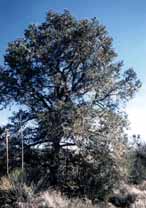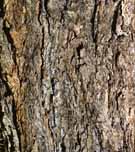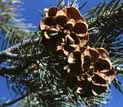
Mature tree growing in the mountains N of Los Angeles, CA [C.J. Earle, 8-Mar-1998].  Bark on a tree in the White Mountains, California. Width of view about 30 cm [C.J. Earle, 27-Mar-1987].  Foliage and seed-bearing cones on a tree in the White Mountains, California. Width of view about 15 cm [C.J. Earle, 27-Mar-1987]. |
Pinus monophylla
Torrey & Frémont 1845
Common NamesSingleleaf piñon (3); one-leaved, Gray, Frémont, or Nevada nut pine (5).Taxonomic notesSubsection Cembroides (6). Syn: Caryopitys monophylla (Torrey & Frémont) Rydberg; Pinus californiarum D.K. Bailey; P.cembroides Zuccarini var. monophylla (Torrey & Frémont) Voss (1).DescriptionTrees 5-9(14) m tall and up to 50 cm diameter, strongly tapering, much branched; crown usually rounded, dense. Bark red-brown, irregularly furrowed or cross-checked, scaly. Branches spreading and ascending, persistent to near trunk base; twigs stout, orange-brown, aging brown to gray, sometimes sparsely puberulent. Buds ellipsoid, light red-brown, 0.5-0.7 cm, resinous; scale margins fringed. Needles 1 (rarely 2) per fascicle, ascending, persisting 4-6(10) years, 2-6 cm x 1.3-2(2.5) mm, stout, curved, terete (though often 2-grooved), gray-green, all surfaces with stomatal lines, margins entire, apex subulate; sheath 0.5-1 cm, scales soon recurved, forming rosette, shed early. Staminate cones ellipsoid, ca. 10 mm, yellow. Ovulate cones maturing in 2 years, shedding seeds and falling soon thereafter, spreading, symmetric, ovoid before opening, broadly depressed-ovoid to nearly globose when open, 4-6(8) cm, pale yellow-brown, nearly sessile; apophyses thickened, slightly raised; umbo subcentral, raised or depressed, nearly truncate, apiculate. As with other piñons, the seeds rest in a deep cone-scale declivity and upper cone scale tissue holds the seeds in place, so seeds do not readily fall out and are readily available to avian dispersers. Seeds cylindric-ellipsoid; body 15-20mm, gray-brown to brown, wingless, edible. 2 n =24 (7, 9, 12).RangeUSA: Idaho, Utah, Nevada, Arizona, California; Mexico: Baja California Norte. 1000-2300 m. Prefers dry, gravelly slopes in semiarid country, where it forms woodlands alone or with juniper ( Juniperus sp.) (7, 9). See also (13).Big TreeDiameter 133 cm, height 14 m, crown spread 12 m, located in Inyo County, California (11).Oldest652 years. This is based on the Pequop Summit tree-ring chronology collected by Charles Stockton, with one core from a presumably live tree, dating from 1330 to 1982 (10).DendrochronologyHas been used in stable-isotope studies, historical archeology (dating the construction of old mine buildings), air pollution assessment, and a wide variety of climate studies (8). NOAA lists 15 chronologies for this species (10).EthnobotanyThe large, nutritious seeds were a staple food for native americans living within the range of this species.ObservationsSeen widely throughout its range. Piñon-Juniper woodlands are particularly well-developed in east-central Nevada, while the largest and most impressive individual trees I have seen have been in Joshua Tree National Park (CA), near the southwest range limits of the species.RemarksThe only pine bearing a single needle per fascicle.Hybridizes with P.edulis and P.quadrifolia (9). Singleleaf piñon is the state tree of Nevada (9). Citations(1) Silba 1986 .(2) Jaeger . (3) Arno & Gyer 1973 . (5) Peattie 1950 . (6) Perry 1991 . (7) Little 1980 . (8) Bibliography of Dendrochronology . (9) Robert Kral in the Flora of North America online . (10) NOAA Tree Ring Search Page . (11) American Forests 1996 . (12) Ronald M. Lanner, e-mail communication, 20-Dec-1999. (13) Robert S. Thompson, Katherine H. Anderson and Patrick J. Bartlein. 1999. Atlas of Relations Between Climatic Parameters and Distributions of Important Trees and Shrubs in North America. U.S. Geological Survey Professional Paper 1650 A&B. URL= http://greenwood.cr.usgs.gov/pub/ppapers/p1650-a/pages/conifers.html, accessed 22-Jan-2000. See also: |
|
[ Pinus ] [ Pinaceae ] [ home ]
This page is from the Gymnosperm Database
|